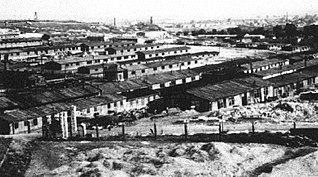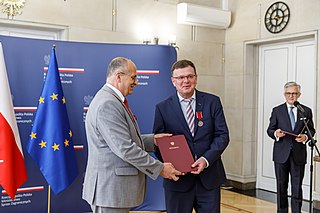Related Research Articles

Majdanek was a Nazi concentration and extermination camp built and operated by the SS on the outskirts of the city of Lublin during the German occupation of Poland in World War II. It had seven gas chambers, two wooden gallows, and some 227 structures in all, placing it among the largest of Nazi concentration camps. Although initially intended for forced labor rather than extermination, it was used to murder people on an industrial scale during Operation Reinhard, the German plan to murder all Polish Jews within their own occupied homeland. In operation from 1 October 1941 to 22 July 1944, it was captured nearly intact. The rapid advance of the Soviet Red Army during Operation Bagration prevented the SS from destroying most of its infrastructure, and Deputy Camp Commandant Anton Thernes failed to remove the most incriminating evidence of war crimes.
The Stefan Batory Foundation is an independent Polish non-government organization established by American financier and philanthropist, George Soros, along with a group of Polish opposition leaders of 1980s, and registered in Poland since May 1988. It is named after Stephen Báthory, the 16th-century Polish king. The foundation's mission is to support the development of an open, democratic society in Poland along with other Central and East European countries.

Pruszków is a city in east-central Poland, situated in the Masovian Voivodeship since 1999. It was previously in Warszawa Voivodeship (1975–1998). Pruszków is the capital of Pruszków County, located along the western edge of the Warsaw urban area.

The German camps in occupied Poland during World War II were built by the Nazis between 1939 and 1945 throughout the territory of the Polish Republic, both in the areas annexed in 1939, and in the General Government formed by Nazi Germany in the central part of the country (see map). After the 1941 German attack on the Soviet Union, a much greater system of camps was established, including the world's only industrial extermination camps constructed specifically to carry out the "Final Solution to the Jewish Question".
Józef Garliński was a Polish historian and prose writer. He was a survivor of Auschwitz concentration camp and wrote books on the history of World War II, some of which were translated into English. In particular, his book Fighting Auschwitz, translated into English in 1975, became a best-seller.

Józef Szajna was a Polish set designer, director, playwright, theoretician of the theatre, painter and graphic artist.

Bełżec is a village in Tomaszów Lubelski County, Lublin Voivodeship, in eastern Poland. It is the seat of the gmina of Gmina Bełżec. It lies approximately 8 kilometres (5 mi) south of Tomaszów Lubelski and 114 km (71 mi) south-east of the regional capital Lublin. It is located in the Roztocze region.
Franciszek Piper is a Polish scholar, historian and author. Most of his work concerns the Holocaust, especially the history of the Auschwitz concentration camp. Dr. Piper is credited as one of the historians who helped establish a more accurate number of victims of Auschwitz-Birkenau death camps. According to his research, at least 1.1 million people were murdered at Auschwitz-Birkenau, of whom about 960,000 were Jewish. He is the author of several books and chair of the Historical Department at the Auschwitz-Birkenau State Museum.

Piotr Mateusz Andrzej Cywiński, is a Polish historian, medievalist and social activist. He has served as Director of the Auschwitz-Birkenau State Museum since 2006. From 2000 to 2010, he was the Director of the Catholic Intelligentsia Club (KIK) in Warsaw.

The Auschwitz-Birkenau State Museum is a museum on the site of the Auschwitz concentration camp in Oświęcim, Poland.

Witold's Report, also known as Pilecki's Report, is a report about the Auschwitz concentration camp written in 1943 by Witold Pilecki, a Polish military officer and member of the Polish resistance. Pilecki volunteered in 1940 to be imprisoned in Auschwitz to organize a resistance movement and send out information about the camp. He escaped from Auschwitz in April 1943. His was the first comprehensive record of a Holocaust death camp to be obtained by the Allies.

Albert Stankowski is a Polish historian and a member of the Jewish Historical Institute Association in Poland (2011-2015). He is a former Head of the Digital Collection Department of the Museum of the History of Polish Jews., adviser for contacts with the Jewish community, and originator and creator of Virtual Shtetl. On March 2, 2018, he was appointed by the deputy prime minister and minister of culture and national heritage Piotr Gliński, for the position of head of the Warsaw Ghetto Museum.

The organization of underground resistance movements in Auschwitz concentration camp began in the second half of 1940, shortly after the camp became operational in May that year. In September 1940 Witold Pilecki, a Polish army captain, arrived in the camp. Using the name Tomasz Serafiński, Pilecki had allowed himself to be captured by Germans in a street round up (łapanka) with the goal of having himself sent to Auschwitz to gather information and organize resistance inside. Under Pilecki's direction the Związek Organizacji Wojskowej, ZOW, was formed.

Piotr Setkiewicz is the director of Centre for Research at the Auschwitz-Birkenau State Museum ; a graduate of the Faculty of History at the Jagiellonian University in Kraków. Setkiewicz received his Ph.D. degree in 1999 at the University of Silesia in Katowice for the work entitled IG Farben - Werk Auschwitz 1941-1945. He is the editor-in-chief of scientific publication The Auschwitz Journals as the head historian at the Auschwitz Museum.
Elly Kleinman is an American business executive and philanthropist best known as the founder and chief executive officer of the Americare Companies. He is the co-chairman of the Ohel Board of Directors, Chairman of Camp Kaylie Board of Trustees, and a former trustee of Maimonides Medical Center. In 2012 he was the chairman of 12th Siyum HaShas.

Grzegorz Berendt is a Polish historian. He is a professor at the University of Gdańsk and affiliated with the Institute of National Remembrance. Berendt is the director of the Museum of the Second World War.

Anna Maria Hinel was a Polish girl scout, activist of the underground independence movement during World War II, author of a diary from the German Nazi occupation.
Kalman Sultanik was a prominent Zionist figure who was active in numerous Jewish and Zionist organizations throughout his life. He was a member of the United States Holocaust Memorial Council, served on the Executive Committee of the Jewish Agency for Israel and became vice president of the World Jewish Congress as well as chairman of the World Zionist Organization American Section. He founded the Jerusalem Confederation House and led the World Confederation of United Zionists for decades. Sultanik was also active in assisting the Polish community of Holocaust survivors.
Maria Zalewska is a media, memory, and Holocaust scholar who focuses on the relationship between interactive technologies, visual culture, and Holocaust memory. She currently serves as the executive director of the Auschwitz-Birkenau Memorial Foundation, a New York-based non-profit organization.

The Auschwitz-Birkenau Memorial Foundation (ABMF) was founded in New York, USA, in 2012 as a non-profit organization dedicated to supporting the preservation of the original artifacts and grounds of the former Nazi German concentration and extermination camp KL Auschwitz I and Auschwitz II Birkenau, supervised by the Auschwitz-Birkenau State Museum in Oświęcim, Poland.
References
- ↑ "Foundation Statutes". Archived from the original on 20 July 2011. Retrieved 6 July 2010..
- ↑ "Niemcy dadzą milion euro na renowację muzeum Auschwitz". www.wiadomosci.gazeta.pl. 27 February 2010. Archived from the original on 16 July 2012. Retrieved 6 July 2010.
- ↑ "Niemieckie środki dla biura Fundacji Auschwitz-Birkenau". 18 June 2010. www.warschau.diplo.de. Retrieved 6 July 2010.
- ↑ "Merkel to give Auschwitz 60 million euros from Germany during first visit". Reuters. 2019-12-05. Retrieved 2023-05-10.
- ↑ "USA dają 15 mln dolarów na Muzeum Auschwitz: By nienawiść nie zadała rany ludzkości". 3 July 2010. wiadomosci.gazeta.pl. Retrieved 6 July 2010.
- ↑ dżek (2010-07-03). "USA dają 15 mln dolarów na Muzeum Auschwitz: By nienawiść nie zadała rany ludzkości". Gazeta Wyborcza. Gazeta Wyborcza . Retrieved 2014-09-29.
- ↑ "Wielka Brytania dołącza do grona państw-donatorów Fundacji Auschwitz-Birkenau". Auschwitz-Birkenau Museum and Memorial Site. Auschwitz-Birkenau Museum and Memorial Site. 2011-06-05. Archived from the original on 2011-09-24. Retrieved 2011-06-06.
- ↑ "Polska wesprze Fundusz Wieczysty dla Auschwitz". Miejsce Pamięci i Muzeum Auschwitz-Birkenau. Miejsce Pamięci i Muzeum Auschwitz-Birkenau. 2011-09-14. Retrieved 2011-10-18.[ permanent dead link ]
- ↑ "Izrael wspiera Fundację Auschwitz-Birkenau". Miejsce Pamięci i Muzeum Auschwitz-Birkenau. 2011-09-23. Archived from the original on 2011-11-12. Retrieved 2011-10-18.
- ↑ "Francja przekaże 5 mln euro dla Fundacji Auschwitz-Birkenau". Newsweek Polska. Am/PAP. 2011-12-27. Archived from the original on 2014-09-29. Retrieved 2014-09-29.
- ↑ "Wsparcie Watykanu dla Fundacji Auschwitz-Birkenau". Miejsce Pamięci i Muzeum Auschwitz-Birkenau. ps. 2014-09-29. Archived from the original on 2014-10-06. Retrieved 2014-09-29.
- ↑ "Foundation Council". www.foundation.auschwitz.org. Retrieved 2021-10-28.
- ↑ "International Committee". www.foundation.auschwitz.org. Retrieved 2021-10-28.
- ↑ "Management Board". www.foundation.auschwitz.org. Retrieved 2021-10-28.
- ↑ "Financial Committee". www.foundation.auschwitz.org. Retrieved 2021-10-28.